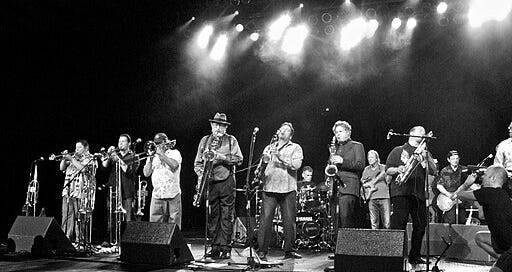What is hip may be the timeless--albeit generally elusive and usually fluid--question connected with one of the most venerable groups in music history. The more challenging and indefinable inquiry may be: "What is Tower of Power?"
What is hip may be the timeless--albeit generally elusive and usually fluid--question connected with one of the most venerable groups in music history. The more challenging and indefinable inquiry may be: "What is Tower of Power?"
Funk outfit? Jazz fusion on steroids? Brass band? Dance collective? Maybe a hirsute combination of all of the above?
"We're a soul band," says TOP founding father and tenor sax player, Emilio Castillo.
For more than fifty years, Tower of Power has blazed their own trail with a rich collection of lush brass and orchestral ballads, floor busting funk numbers, and socially conscious vibes--soul music. In their wake are a legion of admirers in the music industry and fervent fans on dance floors in North America, Asia and Europe.
But, that all might have turned out different had Castillo failed to listen to his father, not once, but twice.
After moving from Detroit to the East Bay near Oakland, California, at the age of 11, Castillo was busted, along with his brother and best friend, stealing t-shirts from a major department store. His father gave him a choice--and a notebook.
"He said 'Fill it with why you're never going to steal again'," Castillo said. "And when you're in that room filling out that notebook, I want you to think of something that's gonna keep you off the streets and out of trouble or you're never coming out of that room again.
"The Beatles had just come out. We said, 'Dad, we want to play music.' He said, 'Get in the car.' And, he took us to the music store and he said, 'Anything you want.'" Castillo picked a saxophone, his brother the drums. A career in crime was averted and a career in music born. Literally, at that moment.
"We rented some instruments that day, came home, started a band that day," Castillo recalled. "We didn't play our instruments and take lessons, get really good, and then join a band. We started a band, then we learned how to play.
"I remember my brother was banging on the drum and I was squeaking on the saxophone and my friend Jody was messing up the intro to Pretty Woman by Roy Orbison on guitar. And, my mother walked in and she said, 'They're going to be huge stars.'"
Castillo laughed. "I never looked back. I've had a band ever since."
During the next few years, Castillo learned to play the guitar and the keyboards, specifically, the Hammond B-3 organ at a club where his band, the Motowns (suggested by Castillo's mother since they were from Detroit) played after hours on the weekends in the Bay Area. He became quite fond of the instrument so much so that he sought the B-3 when the group was away from the club.
"We were doing a Fourth of July weekend at the Alameda County Fair," Castillo recalls. "We were opening for this pretty famous band, the Loading Zone. And, they had a very good organ player and he played a big B-3 organ. So I asked if I could borrow it."
The Loading Zone wanted to check out Castillo, make sure he was cool.
"Doc, at that time, was a roadie for the Loading Zone, the worst roadie that ever existed," Castillo laughed. "They sent Doc over to interview me, to see that I was OK to play the organ."
Stephen "Doc" Kupka asked what Castillo's band was like. The Detroit native idolized a popular East Bay soul band, the Spiders--who had "kicked the Loading Zone's butt" the week before at a battle of the bands at Lake Berryessa--and Castillo offered that the Motowns were like the Spiders. "Oh," Doc said. "You can use the organ."
After the Motowns played, Kupka offered a critique to Castillo. "Doc says, 'You've got a really good band. There's only one thing wrong. Your horn section, it needs a little bottom. By the way, I play baritone sax and I have a Selmer with a low A key.'"
Castillo invited Kupka to come for an audition the following Tuesday. Naturally, Castillo forgot about the invitation.
"We're rehearsing in my garage and there's this banging on the door," Castillo recalls. "It's Doc. And, he's there with this big horn. At the time, the doors didn't work so we always went through the window and I'm yelling, 'Go through the window'.
"The guys are going 'Who is this guy?' I said, 'I told this guy he could audition'. And they got angry. 'We told you--no more of these square horn players.' I said, 'This guy, he's different. He's a character. He plays the baritone sax.' They said, 'What?' 'He's got a Selmer with a low A key.
"The next thing they see is this long-haired hippie coming through the window with a baritone sax." Kupka played three songs with the group--'Philly Dog' by the Markeys, 'Cold Sweat' by James Brown and 'Tell Mama' by Etta James--one of the group's signature songs.
After the three songs, Castillo recalled, "The guys' eyes got really wide and my dad walked in and he tells me, 'Mimi, come in the kitchen. I need to talk to you.' My dad never interfered with the band. I stopped the rehearsal and went into the kitchen. He looks at me and he goes, 'Hire this guy. He's got something.'"
Dad was right, again. Kupka became a member of the band, playing his first gig in August 1968. More than fifty years later, through commercial success, critical acclaim, countless personnel changes, including thirteen lead vocalists, drug addiction, near breakups and shifting music tides, Tower of Power has endured, survived and thrived with Castillo and Kupka the timeless foundation of the group.
"We found a long way time ago that when we stay true to ourselves, our fans seem to love it," Castillo said. "We don't try to chase trends or do what's on the radio or try to please the fans. We make our music really selfishly, we make it to please ourselves."
Yes, soul music.
-30-






You got to funkifize.